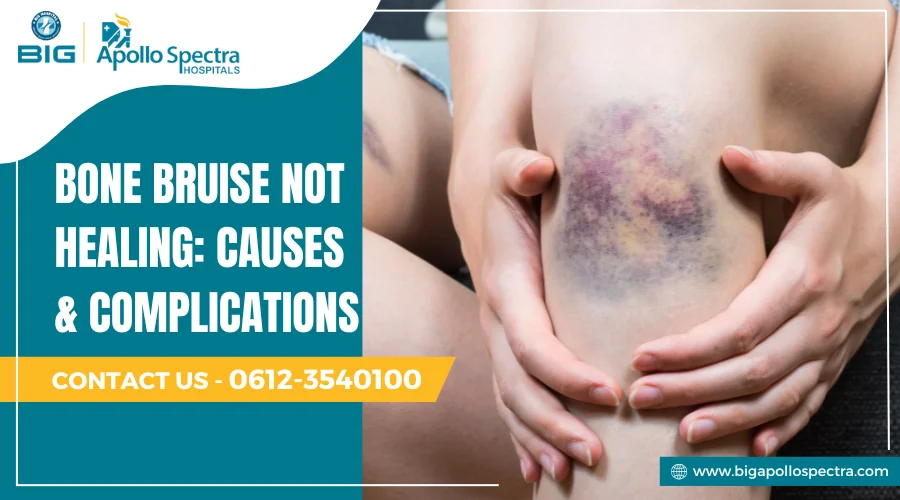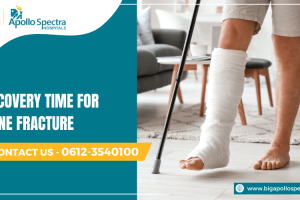Bone bruises represent painful injuries where the trabeculae inside bones sustain microscopic damage without breaking completely. Direct impact from events like falls or vehicle collisions typically cause this injury.
A bone bruise extends to the deeper layers of bone tissue which results in extended periods of pain along with swelling and stiffness.
The bone bruise healing time varies according to its severity and the affected location. Bruises that are superficial usually resolve in 4 to 8 weeks, but those reaching deeper tissue levels may require several months for complete healing.
Healing speed can also vary significantly depending on factors like aging, lifestyle habits, and general health status. Individuals sometimes experience cases where their bone bruise isn’t healing according to normal expectations.
Learning the reasons behind bone bruise not going away along with receiving prompt medical attention helps to avoid permanent health issues.
Bone Bruise Not Healing – 5 Causes
Bone bruises generally heal after a few weeks, but there are cases where healing can take much more time. If you’re wondering “Why is my bone bruise not healing”, usually multiple factors can explain the condition.
Medical conditions combined with lifestyle choices and improper care after an injury can cause healing to get delayed. This section lists five common factors to explain why a bone bruise isn’t healing as expected.
1. Insufficient Blood Supply
Bones require proper blood circulation to heal itself. Certain bones including the shin bone, knee joint, and ankle have limited blood circulation which causes slower healing processes in these specific areas.
Moreover, medical conditions including diabetes and cardiovascular diseases along with peripheral artery disease can worsen poor blood circulation.
Smoking and heavy drinking causes blood vessel constriction which limits the delivery of essential nutrients and oxygen required for bone repair.
Extended recovery time for shin bone bruise or a delayed bone bruise knee healing time might indicate that inadequate circulation is causing the delay. Consulting with a highly recommended top rated orthopedic doctor in Patna will help diagnose and treat any circulation issues that prevent proper healing.
2. Continued Stress or Re-injury
Going back to your usual activities too soon may be the cause of increase in injury and slower healing.
Leg, knee, and foot bones tend to bear the most pressure. Sometimes, even daily activities, such as walking, running, or climbing stairs may worsen the problem if the bone has not yet healed properly.
Compelling oneself to endure the pain or the discomfort from movement will eventually lead to one of the following: chronic joint injuries or bone fractures. That’s why in the event when bone bruise recovery time is much longer than expected, resting and avoiding excessive physical activity is the best course of action.
While not cheap, crutches, braces, and compression wraps can be of help in reducing pressure on the affected site. Lastly, your orthopedic doctor can offer the best advice for healing and getting you back to your regular activities in a safe way.
3. Underlying Medical Conditions
Certain health problems can weaken the body’s natural ability to heal. For example, a lack of healing in the case of a bone bruise can be related to many health issues:
- Osteoporosis: The condition makes bones fragile and slows down the natural healing process.
- Nutrient deficiency: Proper nutrition is really important for bone repair. Vitamin D together with calcium are the important minerals.
- Autoimmune diseases: Health disorders like rheumatoid arthritis cause inflammation that can compromise the healing process.
It is also to be noticed that patients with blood disorders or chronic inflammatory conditions are more prone to experience swelling and discomfort.
Your doctor will usually take blood tests or imaging of bones in order to define the possible problem. Correct medical treatments combined with nutritious diet, supplemental intake, and some lifestyle changes can help manage the condition and enhance healing.
4. Poor Nutrition and Hydration
For an individual to recover smoothly, intake of the required nutrients in proper amounts is a must. When there’s deficiency of calcium, vitamin D, vitamin K, and protein, bones have difficulty repairing the damaged tissues thoroughly.
It is imperative to stay well-hydrated as dehydration causes poor delivery of nutrients to the damaged tissues and, hence, the delayed recovery.
One who has persistent bone bruises can see improvements by taking dairy products as well as leafy greens, lean proteins, and nuts. In the case of patients who are severely deficient, medical professionals will suggest the intake of supplements.
If the body is hydrated and the electrolyte levels are right, the tissue repair process is usually quicker and the inflammation is reduced as well. A comprehensive nutritional plan, at the same time, shortens the recovery time and helps prevent the rise of additional health problems.
5. Lack of Proper Rest and Immobilization
Proper bone healing can only happen in cases where the affected area is kept stable and there’s minimal movement. On the contrary, the trauma from overuse of the area during the healing period might prolong the recovery time to several months.
You can also make use of splints, braces or casts to keep the area stable and significantly shorten the recovery time from injury.
However, for real fast recovery of a broken bone, a good sleep schedule and rest are also required.
It’s during the deep sleep stage that the body rebuilds tissues most efficiently, and that’s why at times the healing might take longer than expected if we do not get enough rest.
Also, it’s best to refrain from high-impact activities during the recovery period. You can use assistive devices and follow a gradual return-to-activity schedule to enhance healing.
If even after following all these steps, you continue to experience swelling and pain, decide to visit a doctor to discuss the need for further treatment options.
Common Complications of a Bone Bruise Not Healing
The main symptoms of a bone bruise involve persistent deep pain combined with swelling, stiffness, and tenderness. Physical activity and direct pressure can increase the severity of these symptoms even more.
Moreover, if the bruise lasts for a long time, it often results in increased pain severity and limited mobility. Some patients can also experience internal bleeding that can cause discoloration in the affected area.
If you’re noticing the throbbing sensation of a bone bruise with significant discomfort, it usually indicates inflammation.
These sensations can intensify at night or when resting. These complications alone can make consulting a specialist an extremely important step.
Potential Complications
Untreated bone bruises can develop into multiple complications, including:
- Bone Necrosis: This condition happens when your bone tissues don’t get enough blood supply. This can lead to tissue death, which requires medical treatment.
- Chronic Pain: When the injury remains untreated, there’s a really high chance of experiencing chronic pain.
- Joint Damage: When a chronic bruise develops near a joint, it can progress to arthritis or cause cartilage wear.
- Weakened Bone Structure: Ongoing bone damage leads to a higher risk of fractures.
- Persistent Swelling: Inflammation can persist for several months leading to discomfort and lack of mobility.
Evidently, failing to address a bone bruise that is not healing can have serious consequences and cause serious health issues. Taking immediate action improves recovery outcomes while preventing permanent damage.
Treatment Options
When the healing process of a bone bruise stalls, the following treatments can offer you the needed support:
- Pain Relief: Ibuprofen and other similar anti-inflammatory medications can help reduce both pain and swelling in the affected area.
- Physical Therapy: The affected area can gain improved strength and mobility through professionally advised gentle exercise routines.
- Cold & Heat Therapy: While ice packs can reduce early swelling, proper heat treatment increases blood circulation in the affected site.
- Bracing & Immobilization: Crutches, braces, or splints serve to prevent additional damage to the injured area.
- Dietary Adjustments: Bone repair gets a boost through sufficient intake of calcium, vitamin D, and protein.
A combination of lifestyle modifications including proper hydration, avoiding alcohol consumption, and refraining from smoking can lead to a significantly faster recovery process.
Furthermore, adequate water consumption helps essential nutrients reach the site of injury. On the other hand, not smoking or consuming alcohol keeps blood circulation normal and that accelerates healing processes.
However, patients whose bone bruise recovery periods extend beyond normal durations should seek immediate advice from an orthopedic specialist.
When is It Necessary to Seek Medical Attention?
You need to seek medical attention if your bone bruise is not healing in spite of proper rest and care. Consult a doctor if you experience the following:
- Severe pain that lasts beyond 8–12 weeks.
- Limited mobility or difficulty in bearing weight.
- Noticing swelling along with redness or warmth, which could signal an infection.
- Palpable signs of worsening joint stiffness or pain.
These signs indicate that medical attention is required to prevent any more future complications. Getting the right treatment will also help you get rid of discomfort while enhancing mobility.
Seeking treatment at the top orthopedic hospital in Patna ensures that you get access to exceptional orthopedic care for unhealed bone bruises.
In order to evaluate the full extent of damage, a doctor might suggest an MRI scan. Whereas, certain situations may require bone stimulation therapy to speed up the healing process.
Seek Medical Care to Prevent Complications
A bone bruise not healing in the right way within the expected timeframe is bound to cause some level of frustration.
However, understanding its causes along with possible complications in case you don’t get timely treatments helps in effective recovery and medical supervision. Persistent symptoms that are not addressed may result in permanent damage to joints and bones.
That’s why it is suggested to get help before it’s late and the symptoms worsen. Complete healing is often possible with adequate rest along with proper nutrition and professional medical treatment. Consult an orthopedic specialist for further evaluation in case you have doubts.
At Big Apollo Spectra Hospital, orthopedic care specialists offer personalized treatment plans to guarantee optimal recovery on time.
Seek expert diagnosis and bone bruise solutions at Patna’s leading hospital for orthopedic treatment in order to begin proper healing and recovery.






